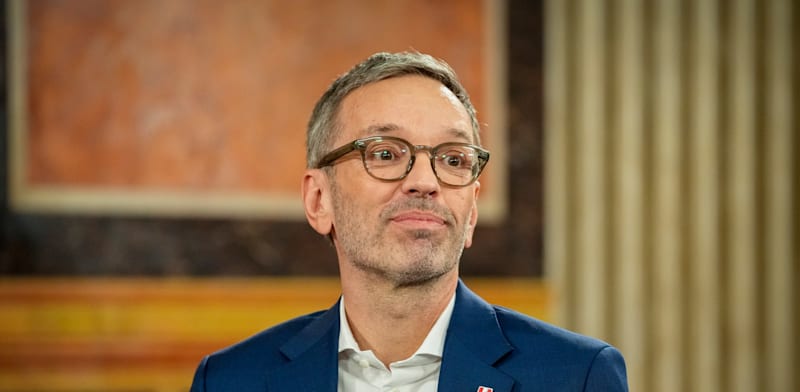For the first time in Austria’s modern history, a far-right party received the mandate to form a government and appoint a chancellor. The President of Austria, Alexander van der Baalen, today (Monday) assigned the task of building the coalition to Herbert Kikel, who heads the Austrian Freedom Party, which has Nazi roots; Its supporters are identified with the extreme right, and it leads a policy that opposes immigration to the country. The party leads a critical line towards military aid to Israel, and its supporters are the least pro-Israel, according to surveys conducted in the political system after October 7, 2023.
Kickel received the mandate today (Monday), following the fact that the negotiations between the two former major parties of Austrian politics – the People’s Party (ÖVP) from the center-right and the Social Democratic Party (SPO) from the center-left – did not reach an agreement on a broad unity government intended prevent the Freedom Party (FPÖ) from taking power. The negotiations opened after the elections last September. The Freedom Party, which has known many scandals, resignations and scandals in recent years, garnered the most votes in these elections and received approximately 29% of the voters’ votes. Now, Kikel will have to form a coalition with the People’s Party, which received about 26% of the vote. A similar coalition previously ruled Austria, but this is the first time that the FPO will be the top party in it, appointing a chancellor.
The development, if it ripens into the establishment of a coalition, symbolizes a further strengthening of the right-wing opposition to immigration in Europe. In Italy, the “Brothers of Italy” and “Helga” parties are already in power, as well as in Sweden and Finland. In the Netherlands, Geert Wilders’ Freedom Party is the largest in the political system; And in Germany, “Alternative for Germany”, from the extreme right, is in second place in the polls ahead of the general elections on February 23. Kickel succeeded in reviving the party after Heinz Christian Strache, its once popular leader, resigned after being filmed accepting a bribe before a previous election at a villa in Ibiza.
The party has demonstrated more central positions in recent years, and is not opposed to the European Union, for example, but is haunted by anti-Semitic and neo-Nazi incidents. In fact, it was already established in the 1950s by Nazis, and was considered taboo until the arrival of Jairg Haider, who turned it into a significant political force. Haider demonstrated anti-Israeli and anti-Jewish attitudes, and was close to anti-Israeli leaders, such as Gaddafi. After he died in a car accident, Strache took her in an anti-Islamic direction, offering a “bear hug” to the Jewish community and Israel. Stracha was invited to Israel several times, including to visit Yad Vashem, by the Likud movement. Senior members of the party, including ministers, met with him.
The Jewish community in Austria strongly opposes the party
The party did show pro-Israel positions in recent years, but after the current war in Gaza, the policy changed and with it the general tone. The fact that the party is pro-Russian, strongly opposes the war in Ukraine and echoes messages from Moscow, was reflected in a series of statements against European military aid to Israel and interference in the situation in the Middle East in general. The party’s candidate for the European Parliament elections last June, Harald Vilimski, said that Austria’s support for Israel is “wrong”.
A survey that took place after the October 7 terrorist attack by Hamas in Austria found that only 43% of the party’s voters expressed solidarity with Israel, compared to 57% of the general public. This is the lowest rate among the parties in Austria.
Before the last election in September, Kikel expressed more moderate positions regarding support for Israel, compared to Chancellor Karl Nahammer of the People’s Party. “Austria should strive for good bilateral relations with other countries in general, and of course with Israel as well,” he said. Nahammer, on the other hand, promised “firm solidarity with Israel”, as part of the OVP’s election platform. The party’s platform also opposes kosher slaughter in Austria.
Kikel, who may soon be chancellor, refused to unequivocally condemn the SS in a controversial 2010 statement that was recently published. In a discussion with the chairman of the Jewish community in Austria, Kikel said that it is “nonsense” to define the SS as a “collectively guilty organization”, as was done in the Nuremberg trials. “I do not agree with the statement that the Waffen-SS will be considered guilty collectively,” he said, and claimed that each case must be “judged individually.” A series of past incidents among party members showed membership in neo-Nazi youth movements, raised hand salutes, use of Nazi motifs and more. At the funeral of a senior member of the party that took place this year, those present sang an SS anthem. The Jewish community in Austria strongly rejects cooperation with the party.
Please note: The Globes system strives for a diverse, relevant and respectful discourse in accordance with the code of ethics that appears in the trust report according to which we operate. Expressions of violence, racism, incitement or any other inappropriate discourse are filtered out automatically and will not be published on the site.
